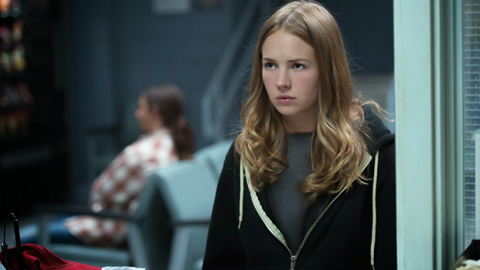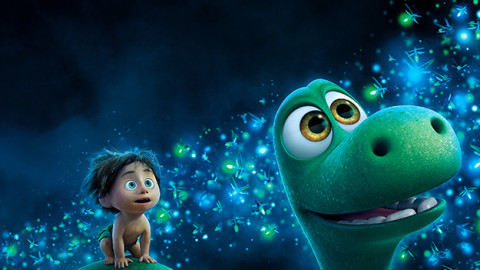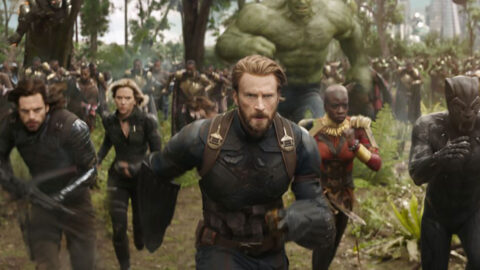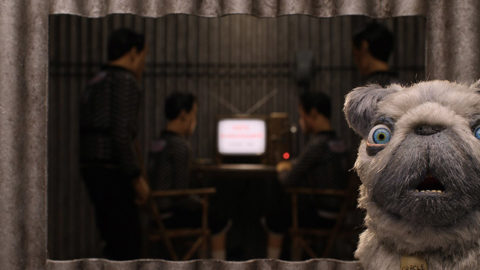Deep Focus: Incredibles 2
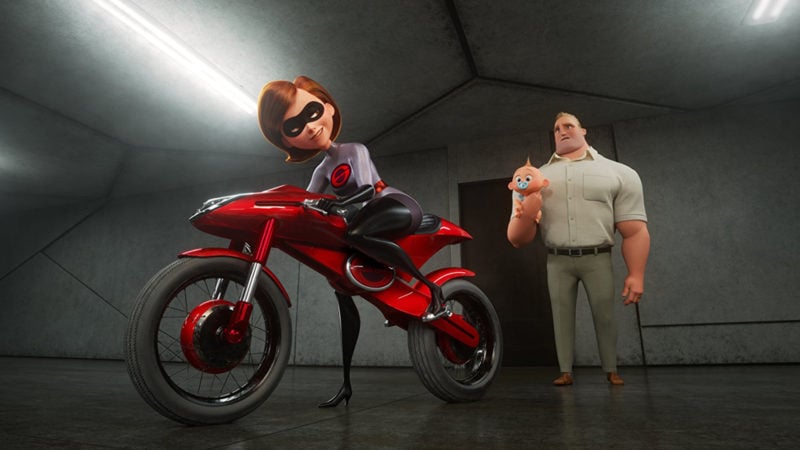
Levity plus ebullience equals buoyancy. That’s what Brad Bird proves in his Incredibles movies as they take off in the opening minutes and keep soaring for two hours. In Incredibles 2, he doesn’t merely use an introductory setpiece to hook an audience but to establish the bold outlines of his story and a pace and standard of invention for the movie to come. There may be more lyrical directors working in animated features, but no one else has Bird’s knack for crafting ingenious narratives that generate trust and affection and for filling them with feats of comedy and courage that test characters and thrill audiences. Achieving edge-of-your-seat hilarity in the sequel to his 2004 smash, Bird extends and sustains his vision of infusing an American family with the New-Old-World sophistication of Connery-era James Bond, the try-anything derring-do of Mission: Impossible (Bird directed the best one, Ghost Protocol) and, most important, the energizing team spirit shared by all great heroic squads from The Three Musketeers to the Silver Age’s Justice League of America.
In this ongoing extravaganza, set in an alternate reality resembling the pre-counterculture 1960s, the government continues to prohibit Bob Parr/Mr. Incredible (Craig T. Nelson), his family, his best friend, Lucius Best/Frozone (Samuel L. Jackson), and all other “supers” from exercising their powers. (The reason: costly and time-consuming court suits. For example, a man who attempted suicide sued Mr. Incredible for saving his life but ruining his death.) In the first film, Bob rebelled against his job in a blandly corrupt insurance company and back-channeled a return to super-heroism. He ended up on a quest to defeat a superhero-hating techno-wizard named Syndrome (Jason Lee), with the help of his wife Helen/Elastigirl (Holly Hunter), their junior-high-age kids—super-swift Dash (Spencer Fox, now Huck Milner) and invisible-girl Violet (Sarah Vowell)—and even their infant Jack-Jack (Eli Fucile), whose powers became apparent only at the last minute (and only to Syndrome, not his family). Along with Frozone, they savored the excitement of pooling their gifts to defeat a dangerous enemy, even if it meant flouting the law.
Incredibles 2 picks up where the first film left off, so the government still bans superheroism. But the Incredibles won’t give up their adrenalized family bonding without a fight. So when a monstrous driller explodes from the streets of Municiberg and proclaims, with witty Birdian brio, “Behold the Underminer! I am always beneath you, but nothing is beneath me”—and then starts tunneling into a bank vault—Mr. Incredible, Elastigirl, Dash, and Violet barrel, stretch, sprint, and float into the fray.
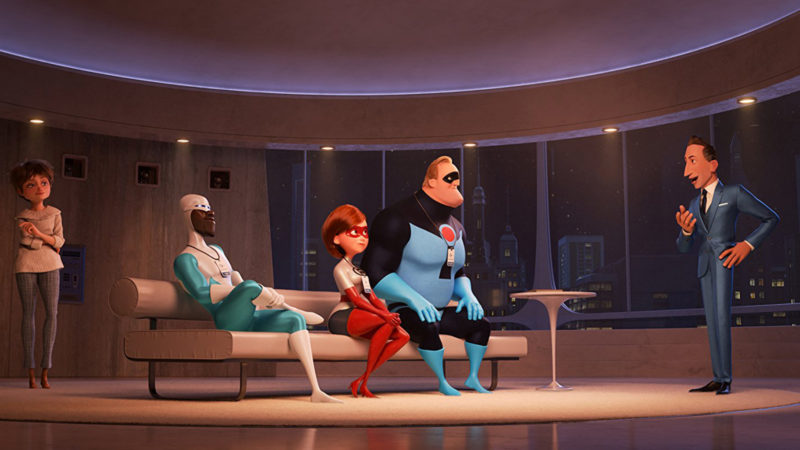
Bird crafts setpieces that multitask while pushing jeopardy to the limit, like having an enormous drill bit almost chew its way into Municiberg City Hall. The beginning swiftly reacquaints us with each Incredible (and Frozone, too), but we also learn in a brisk prologue that Violet’s junior-high crush and prospective first date, Tony Rydinger (Michael Bird), caught a glimpse of her in costume, sans mask. He ran straight to Rick Dicker (Jonathan Banks) of the NSA (the National Supers Agency), who, as the movie starts, takes Tony’s testimony, then wipes his memory clean of all things Violet. When Violet figures out why Tony stood her up on date night, she endures an uproarious bout of superheroine self-hatred. She discovers that a garbage disposal is no match for her indestructible crime-fighting costume. The family comedy humanizes and enlivens the trenchant action farce.
If The Incredibles was a pop epic, Incredibles 2 is a mom-and-pop epic. When telecommunications tycoon Winston Deavor (Bob Odenkirk) makes legalizing super-heroes his cause, he and his design-genius sister Evelyn (Catherine Keener) decide that their best propaganda bet is Elastigirl. Cost-benefit analysis proves that she battles evil more efficiently than Mr. Incredible, who tends to wreak huge collateral damage. So while the Deavors put up Bob and the kids in one of Winston’s deluxe homes (rock formation in the living room, moveable floors atop indoor pools), they move Elastigirl to New Urbem, a media capital where she’ll find juicy criminal targets and plenty of markets for interviews and footage taken with her body-cam.
Bird depicts the Deavors’ flattery of Helen/Elastigirl with genial social-sexual awareness. Evelyn tries coercing her into saying that she feels relieved to emerge from Mr. Incredible’s shadow. But Helen doesn’t go there. She knows she has more flexibility and finesse than her husband, but she also recognizes the difference between a feminist plumping for equality and an executive playing the gender card. Bird is no one-size-fits-all entertainer when it comes to ideas or topical notions. He tries them on and resists stretching them out. In The Incredibles, the anti-superhero forces stood for the leveling powers of mediocrity. In Incredibles 2, Rick Dicker explains the superheroes’ predicament this way: politicians don’t understand people who simply do good because it’s right.
Given the range Bird has exhibited in films like The Iron Giant (1999) and Mission: Impossible – Ghost Protocol (2011), it’s completely credible how well he balances Elastigirl’s ballooning fame and Bob’s skyrocketing responsibilities as a brand-new Mr. Mom. While Elastigirl zeroes in on an arch-villain called Screenslaver, who appears to hypnotize people via video monitors or TV screens, Bob busies himself learning New Math to help Dash with his homework or striving to repair Violet’s puppy-love life. He takes her and Dash and Jack-Jack to a family restaurant (“The Happy Platter’) owned by Tony’s parents. It’s a sign of Bird’s old-school entertainment chops (and perhaps Vowell’s aural expertise) that the biggest laugh in the movie comes from Violet’s spectacular nose-spritz the moment she realizes Tony is her waiter.
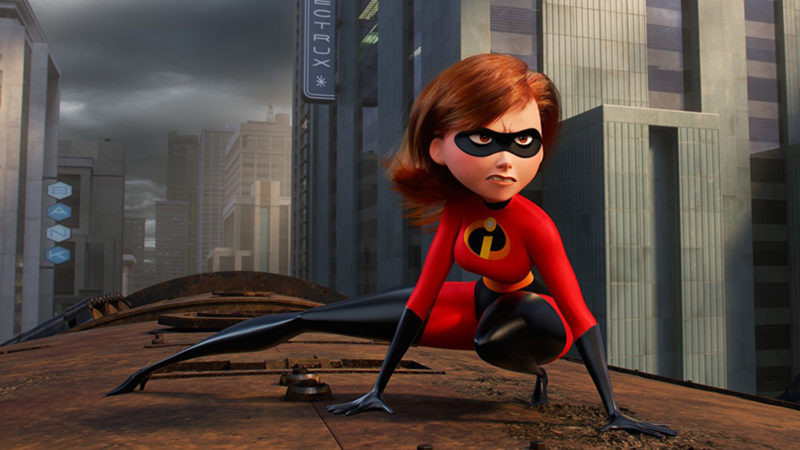
Elastigirl’s exploits are mesmerizing. She can turn her body into a slingshot or a paraglider or five strands of a spider’s web. When her snappy new motorcycle, the Elasticycle, becomes a pair of unicycles, she can stretch enough to ride one on each side of a tunnel. Her part of the story confirms Bird’s status as a toymaster. That’s not merely because of her eye-popping gimmicks, but also because her antagonists let him toy with notions of whether screens are enslaving Americans and superhero fantasies are weakening them.
On the other hand, Bob gets belly laughs. Seeing this big fellow try to corral Jack-Jack is as funny as Dustin Hoffman babysitting for Jessica Lange’s kid in Tootsie. When Jack-Jack explodes with multiple talents (including levitation, telekinesis, laser-blasting, and self-cloning), the kaleidoscopic chaos clarifies the film’s most potent message: moms and dads should treat parenting as an adventure. In a blissful guest-star interlude, that glorious perfectionist Edna Mode (voiced again by Bird himself), couturier to the truly super superstars, develops a maternal streak. She crafts for Jack-Jack his own suit full of sensors that track when he’s about to become a devil child or a laser-blaster. “Combustion Imminent,” reads the monitor, before Jack-Jack bursts into flames. Whenever that happens, the suit can put the fire out with blackberry lavender retardant.
Bird entwines parody, slapstick, sentiment, and character in the unselfconscious spirit of entertainment that has always characterized our popular art at its best. His movie is a rousing, eclectic grab-bag of forms-within-a-form, encompassing everything from mock-newscast to family sitcom. He studs the film with in-jokes. When Jack-Jack flips on the TV we see and hear the intro to The Outer Limits: “There is nothing wrong with your television set. Do not attempt to adjust the picture. We are controlling transmission…”
But it’s the way-out jokes that get you. He develops half a dozen new supporting supers, including Reflux (“Medical condition or superpower? You decide”), who stops bad guys with his molten stomach acid. What’s impressive about Bird is that he doesn’t sell anyone short or give into stereotypes, even when it comes to a slick wheeler-dealer like Winston Deavor. Incredibles 2 spins like a pop-art pinwheel because Bird boasts a coherent and scintillating vision. He turns an action comedy about superhumans into a jamboree of human possibilities.
Michael Sragow is a contributing editor to Film Comment and writes its Deep Focus column. He is a member of the National Society of Film Critics and the Los Angeles Film Critics Association, and a contributor to the Criterion Collection.



